St. John Paul II: The 20th Centurys Greatest Dissident
- TOD WORNER
I would like to nominate St. John Paul II as the 20th centurys greatest dissident.
"I plead with you — never, ever give up on hope, never doubt, never tire, and never become discouraged. Be not afraid."- Pope John Paul II
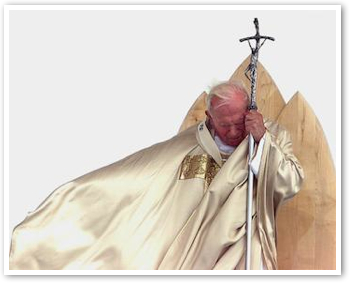 |
Solzhenitsyn. Havel. Bonhoeffer. Kolakowski. These names are forever lionized in the pantheon of noble dissidents. And rightfully so. Aleksandr Solzhenitsyn catalogued the heinous abuses of the Soviet labor camp experience in his greatest work, The Gulag Archipelago. Vaclav Havel endured isolation and harassment as an outspoken playwright who penned the razor-sharp analysis of life under oppressive Czech Communist stooges in his essay The Power of the Powerless. Dietrich Bonhoeffer helped found a Protestant Confessing Church objecting to the Nazification of his former denomination. He then went on to write his seminal work, The Cost of Discipleship, which objected to "cheap grace" in the face of times demanding suffering for Christian truth. And Leszek Kolakowski championed and brilliantly articulated why Marxism was philosophically robust and defensible, only to realize that this simply was not true. In writing his magisterial intellectual indictment of the Communist enterprise, The Main Currents of Marxism, he upheld his intellectual honesty and moral center which led his overseers to strip him of his titles, deprive him of his livelihood and threaten his safety. Consequently, he became the exiled intellectual godfather of the Solidarity movement which first fissured and cracked the edifice of Soviet Communism. How on earth could anyone expect to stand equally in the company of such courageous men? And where would you find them?
Let me say the last place I anticipated finding such a man was the theater. But there he was. In August, 1941, young Karol Wojtyla found himself nearly one year into the Nazi's brutal occupation of Poland. In this short span of time, Wojtyla was forced to quit his University studies, witness his professors and priests sent to concentration camps, work tirelessly in a limestone quarry and chemical plant and, finally, endure the untimely death of his father. And yet in the increasingly hellish killing fields of Nazi racial hygiene, Wojtyla would not opt for fearful passivity. He would become part of a reassembled underground university. He would become a member of "The Living Rosary" serving as a leader of fifteen men charged to live the life of incessant prayer and selfless devotion modeled after St. John of the Cross. And, finally, Karol Wojtyla would act.
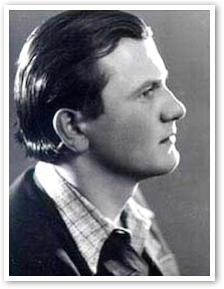
The clandestine Rhapsodic Theater was formed by Mieczyslaw Kotlarczyk. At the end of relentless workdays, a small group of bone-tired, underfed Polish men gathered for twice-weekly demanding rehearsals (at times by candlelight). With the inconvenience of ubiquitous danger, ever-shifting locations and constantly refashioned rehearsal times, the men nonetheless found themselves exhilarated by partaking in the production of robust plays and poems thick with Polish history, culture and inextricably bound to the region's deep Catholicism. But the select group knew that there could be a fearsome cost to their "illegal activity". Nazi "justice" was swift and ruthless especially when it suspected any forms of intellectual or cultural activity. Yet, in spite of this fear, the wickedness of their Nazi overseers and the possible extermination of Polish faith and culture meant that Kotlarczyk and Wojtyla's charge was more vital than ever. This was among the most important forms of resistance against the Nazis: Cultural Resistance. As George Weigel so eloquently frames in his papal biography of John Paul II, Witness to Hope,
"The word of truth, publicly, indeed almost liturgically, proclaimed was the antidote the Rhapsodic Theater sought to apply to the violent lies of the Occupation. The tools for fighting evil included speaking truth to power."
"The young actors of the Rhapsodic Theater 'certainly' thought of themselves as involved in a resistance movementAnd their purpose was equally clear: 'to save our culture from the Occupation' and to help restore the nation's soul, which was a precondition to its political resurrection."
"Karol Wojtyla deliberately chose the power of resistance through culture, through the power of the word, in the conviction that the 'word' (and in Christian terms, the Word) is that on which the world turns."
In front of small, nervous, but enthusiastic gatherings, the Rhapsodic Theater would perform seven productions twenty-two times after over one hundred rehearsals. Karol Wojtyla was a dissident engaged in cultural resistance. And this would not be the last time.
After six bloody years, World War II would end. But Poland's suffering would continue. Nazi oppression would be exchanged for Communist oppression. The declared enemies of Soviet Communism were similar to the declared enemies of National Socialism. And while ideological reasons and semantics abounded, anything that threatened the regime's power was neutralized. The foremost enemy to the Communist state was the Catholic Church. It was during this time that Karol Wojtyla pursued the priesthood in an underground seminary.
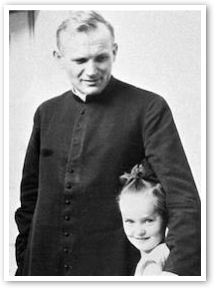
Karol Wojtyla's next act of cultural resistance was to rebut the Communist program in the lives of his parishioners. The Communists worked tirelessly from on high to eradicate religion, break down the family and undermine individual dignity while establishing "Holy Mother State" in its place. Wojtyla saw what was being attempted and sought to counter the State at each point. Catechesis, as Weigel describes, on "the existence of God and the spiritual character of the human person" led parishioners, young and old, through a thoughtful, faithful consideration of the doctrine of the Christian faith. Exploration of the liturgy and its music provided a deeper connection to God and the sacrament of the Eucharist. Lectures on marriage, sexuality and family life reinforced the indispensable, basic unit of society endowed by God and never to be jettisoned in the name of the State or ideology. This tireless priest went on vacation excursions with youth, getting to know them personally and engaging them in intellectual and spiritual discussions to show the relevance of faith to everyday concerns. He wrote and shared essays, poems & plays which encased morals of deep spiritual and cultural import. Finally, Wojtyla endlessly emphasized and modeled the practice of the Faith. Prayer, Mass attendance, Confession, simply communing with fellow believers as the Body of Christ — listening, growing, supporting and loving each other as Christ loves us. He sought to reinforce the dignity of each individual, the unique vocational call given to each of us while reinforcing the accountability that comes with these gifts. In words that embodied Wojtyla's philosophy, Weigel quotes,
"The duty of the priest is to live with his people, everywhere they are, to be with them in everything but sin."
"The greatest choice posed to the human person in the modern world is the choice 'between sanctity and the loss of [one's] humanity".
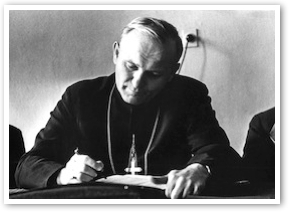
Nearly twenty years would pass. By 1964, Joseph Stalin was dead for over ten years and yet puppets of Soviet Communism would still have an iron grip on Poland. This was the year Karol Wojtyla was called to serve as Archbishop of Krakow. Wojtyla had clearly made an impression on his parishioners, his superiors and his Communist oppressors. His appointment as a guardian of the faithful was met with mixed reaction. The iconic Polish Cardinal Wyszynski tipped his hand of concerned skepticism when asked his impressions of Wojtyla,
"He is a poet."
Even the Communists felt that his age, his intellectual and cultural abstractions proved him to be a naive dreamer and likely easily manipulated to greater Communist ends. Perhaps, they wondered, he could even be a tool to achieve the ultimate demise of Polish Catholicism. According to the Communists, his intellectual discussions, literary interests, call to greater holiness and vocation and his connection to the youth were all irrelevant eccentricities when considered in the context of true power. As Weigel articulates,
"'Cultural resistance' made no sense to [the Communists]. In the orthodox Marxist jargon, ideas were 'superstructure,' ephemera, not the stuff of real power. Let the boyish [Archbishop] preach sermons about the 'supernatural episcopal responsibility for the people of God'Let him urge college students to think about their lives vocationally and go to confession regularly. All of this was opium"
Weigel even tells the tale of a prison warden at Gdansk visiting an imprisoned Abbott from a local Krakow monastery to pompously declare Wojtyla's selection as "very good news". Months later, the same warden would wail, "Wojtyla has swindled us!"
In October, 1978, Karol Wojtyla became the Vicar of Christ, Pope John Paul II. At the age of 59, the relatively youthful pope would return to his native Poland — his bleeding homeland still dominated and ravaged by the Communists. His cultural resistance would be called upon once again. With a kiss of the ground, the Pope would begin his message to his flock: Be not afraid. Remember your right "to [form] your own culture and civilization". The measure of man is not his utility to the state, but his dignity before God. "Receive the Holy Spirit". Remember that your suffering is transformative, like the cross of Christ. Do not give up. "Build your lives with the Gospel". At the final Mass in the Krakow Commons, Pope John Paul II (from Weigel's book) would implore,
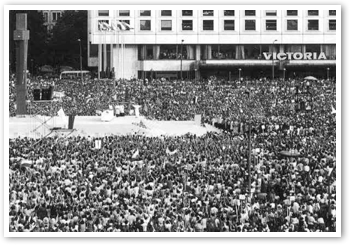
"You must be strong, dear brothers and sistersYou must be strong with the strength of faithToday more than in any other age you need this strength. You must be strong with the strength of hope, hope that brings the perfect joy of life and does not allow us to grieve the Holy Spirit.
You must be strong with love, which is stronger than deathand helps us to set up the great dialogue with man and the world rooted in the dialogue with God Himself, with the Father through the Son in the Holy Spirit, the dialogue of salvation
When we are strong with the Spirit of God, we are also strong with the faith in manThere is therefore no need to fear
SoI beg you: never lose your trust, do not be defeated, do not be discouragedI beg you: have trust, andalways seek spiritual power from Him from whom countless generations of our fathers and mothers have found it. Never detach yourselves from Him. Never lose your spiritual freedom"
The trip to Poland began with a pope kissing the ground. It proceeded with massive public gatherings chanting, "We want God!". And it ended with a Mass hosting two to three million men and women. In a state where God was "illegal", God was demanded. And the Spirit of the Lord would comeand leave the wreckage of Communism in its wake.
Karol Wojtyla, Pope John Paul II, was a dissident. And his weapon of choice was cultural resistance. Even at the peak of his influence as pope he was still a man dissenting from the prevailing philosophy of the world. But regardless of who he was dissenting from, his message was the same. To the violent racial bigotry of National Socialism, the power-hungry machinations of Communism, the dignity-violating utilitarianism of secular fundamentalism and the cynical debasement of hyperconsumerism, Pope John Paul II answered simply: Offer Prayer, Mass, Confession, Communion. Have Faith, Hope, Charity. Preserve Dignity, Integrity, Respect. In two words: Jesus Christ.
The twentieth century was stricken by the most destructive philosophies ever devised my man. And we owe endless debts of gratitude to Solzhenitsyn, Havel, Bonhoeffer, Kolakowski and countless unnamed others. Indeed. But if you will indulge me for one day, I would like to nominate Pope John Paul II, soon to be Pope St. John Paul II, as the 20th century's greatest dissident. May God bless all dissidents and make us worthy of their infinite sacrifice.
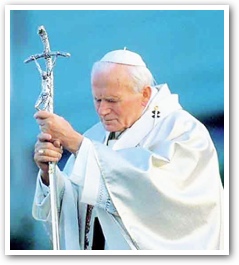
 This is Meaghen Gonzalez, Editor of CERC. I hope you appreciated this piece. We curate these articles especially for believers like you.
This is Meaghen Gonzalez, Editor of CERC. I hope you appreciated this piece. We curate these articles especially for believers like you.
Please show your appreciation by making a $3 donation. CERC is entirely reader supported.

Acknowledgement
Tod Worner. "St. John Paul II: The 20th Centurys Greatest Dissident." A Catholic Thinker (patheos) (April 24, 2014).
Reprinted with permission from the author, Tod Worner.
Founded in 2008, Patheos.com is the premier online destination to engage in the global dialogue about religion and spirituality and to explore and experience the world's beliefs. Patheos is unlike any other online religious and spiritual site and is designed to serve as a resource for those looking to learn more about different belief systems, as well as participate in productive, moderated discussions on some of today's most talked about and debated topics.




